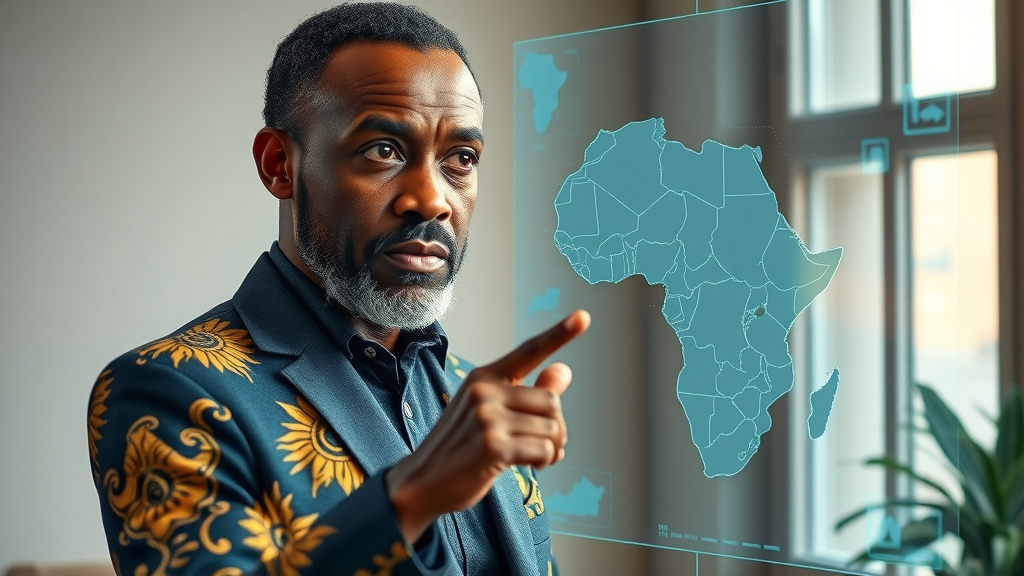Did you know that African businesses building their brands solely on popular social platforms risk losing everything overnight due to opaque algorithm changes? This startling reality underscores the urgency of adopting a decolonial digital media strategy —one that empowers African leaders to reclaim control and forge resilient, sovereign media empires.
Startling Realities of Digital Colonialism in African Media
- The Digital Sharecropper’s Dilemma: African media creators laboriously construct brands on platforms they do not own, akin to sharecropping, where hard-won value benefits platform owners rather than the creators themselves.
- Impact of Global Social Media Algorithms: Systemic biases embedded within the algorithms of dominant social platforms often marginalize African voices, threatening brand sustainability and audience reach.
- Systemic Biases in Digital Media: These deeply ingrained prejudices not only stifle African entrepreneurship but also compromise the independence and growth potential of African media.

Image description: Poignant African media landscape, reflective expression, visualizing algorithmic obstacles, cinematic style, with a backdrop of social media logos dissolving behind an African cityscape, highly detailed with deep saturated colors and moody lighting.
Understanding Digital Sovereignty: The Foundation of a Decolonial Digital Media Strategy
Defining Digital Sovereignty and Its Importance in the Global South
Digital sovereignty refers to the strategic ownership and control over one’s digital real estate—including websites, email lists, and content distribution channels. For African leaders navigating the shifting and often hostile terrain of global digital platforms, digital sovereignty is not just a technical concern—it is a fundamental necessity to protect their media empires from exploitation and sudden algorithmic disruptions.
“Digital Sovereignty means strategic ownership of your digital real estate—your website, your email list, your content distribution channels. It’s about building an owned media platform that becomes your digital fortress.” — Senior Strategist, Africa Chronicle

Image description: Resolute African thought leader, insightful expression, pointing at a digital map of Africa with translucent digital overlays and traditional African patterns in vibrant blues and golds.
The MVR Mandate: Minimum Viable Relationship for Sustainable Media Practices
- Owning your website, email list, and content creation process: These form the pillars of the MVR Mandate, ensuring sustainable relationships with audiences outside fluctuating third-party controls.
- Reducing dependency on third-party social media platforms: Minimizing risks posed by hidden algorithm changes or platform policies hostile to African content creators.
- Building resilient digital media practices: Creating adaptive systems that withstand platform disruptions and preserve audience engagement.

Image description: Modern African startup founder, determined expression, managing media channels on laptop in a cozy workspace highlighted by subtle African artifacts, warm earthy tones.
Challenges of Digital Colonialism and Data Colonialism in African Media
How Colonial Legacies Shape Current Digital Media Experiences
The legacy of colonialism persists in digital forms, where infrastructural dependencies and unequal data ownership perpetuate control over African media narratives. This digital colonialism manifests as disproportionate control by global tech firms over content dissemination and monetization, challenging African media sovereignty.

Image description: Symbolic depiction contrasting traditional African artifacts with modern digital icons, split between a traditional village and a high-tech urban skyline, evocative of the digital colonialism dichotomy.
The Role of Data Colonialism in Undermining African Media Independence
Data colonialism exploits African user data without equitable benefits while funneling control and revenue outside the continent. This practice undermines local media independence by restricting Africans from controlling their data-driven narratives and value creation within digital spaces.
Strategies for African Leaders to Build and Sustain Media Empires
Developing Owned Media Platforms to Counter Digital Sharecropping
- Invest in website development and content management systems: Establishing self-owned platforms ensures control over content and data.
- Grow and nurture an email subscriber base: Direct communication with audiences reduces reliance on unstable social media algorithms.
- Create original content tailored to African audiences: Customized narratives foster deeper engagement and cultural relevance.

Image description: Innovative African media team collaboratively building digital infrastructure within a tech startup environment enriched with African motifs, conveying dynamic teamwork.
Leveraging Media Research and Knowledge Production for Decolonial Perspectives
Building media empires requires not only technological infrastructure but also intellectual sovereignty. Encouraging African scholars to produce and analyze digital media content through decolonial lenses strengthens cultural authenticity and counters external narratives.

Image description: African scholars with focused expressions analyzing digital data in an academic setting accented with vibrant African textiles, symbolizing the fusion of tradition and modern knowledge production.
Common Misconceptions and Pitfalls in Digital Media Ownership
- Relying solely on social media platforms for audience engagement: This traps businesses in unstable ecosystems vulnerable to external policy shifts.
- Underestimating the importance of email marketing: Email remains a critical owned channel for direct and meaningful audience connection.
- Ignoring the impact of algorithm changes on content reach: Lack of diversification risks sudden audience loss and diminished brand visibility.
“Most founders can’t answer ‘yes’ to whether their business would survive if Instagram disappeared tomorrow. That’s the risk of digital sharecropping.” — Senior Strategist, Africa Chronicle

Image description: Concerned African entrepreneur observing disconnected social media icons on mobile device, minimalist workspace, muted tones reflecting caution.
Actionable Tips for African Founders to Achieve Digital Sovereignty
- Audit your current digital media assets and dependencies: Understand your exposure to third-party platforms and data control issues.
- Prioritize building and owning your website and email list: These are foundational assets for lasting media presence.
- Create consistent, high-quality content aligned with your brand values: Authentic storytelling builds loyal audiences.
- Engage directly with your audience through owned channels: Foster meaningful relationships independent of algorithm fluctuations.
- Monitor and adapt to changes in digital media landscapes proactively: Stay ahead of platform policies to safeguard audience connections.
| Strategy | Description | Benefits |
|---|---|---|
| Website Ownership | Control over your digital real estate | Resilience against platform shutdowns |
| Email List Building | Direct communication with audience | Higher engagement and conversion rates |
| Content Creation | Original and tailored media | Stronger brand identity and loyalty |

Image description: Empowered African founder with a cheerful expression, managing newsletter outreach in a cozy café setting decorated with Pan-African decor and sunlight filtering in.
People Also Ask
- What is digital sovereignty and why is it important for African media?
- How can African leaders protect their brands from social media algorithm changes?
- What are the key components of the MVR Mandate?
- How does digital colonialism affect media independence in Africa?
Key Takeaways
- Digital sovereignty is essential for sustainable African media empires, enabling control over digital assets.
- Relying heavily on third-party platforms risks losing audience and brand control overnight.
- The MVR Mandate provides a practical framework focusing on owned websites, email lists, and original content creation.
- Decolonial digital media strategies actively counteract systemic biases and data colonialism pervasive in the digital ecosystem.

Image description: Triumphant African business leader with visionary expression standing in front of monumental digital fortress gates, blending traditional and futuristic skyline elements with majestic dawn lighting.
Conclusion: Embracing a Decolonial Digital Media Strategy for Africa’s Future
Adopting a decolonial digital media strategy is no longer optional—it is imperative for African leaders to construct a resilient, sovereign digital future. Building owned media platforms and adhering to the MVR Mandate safeguards against the precariousness of digital sharecropping while fostering authentic media ecosystems rooted in African realities.
“The time for Digital Sovereignty is now. African leaders must build their digital fortresses to secure their media destiny.” — Senior Strategist, Africa Chronicle
Ready to build your digital fortress?
- Explore strategic insights for African founders at The Founders Africa .
- Visit https://east.africafrontlinemedia.com for expert guidance and resources.
To deepen your understanding of decolonial digital media strategies, consider exploring the following resources:
-
“African Data Ethics: A Discursive Framework for Black Decolonial Data Science” ( arxiv.org ) This paper presents a framework for African data ethics, emphasizing principles like decolonization, community centering, and data self-determination, which are crucial for developing responsible data science practices that mitigate systemic harms.
-
“Reimagining Communities through Transnational Bengali Decolonial Discourse with YouTube Content Creators” ( arxiv.org ) This study examines how YouTube content creators engage in decolonial discourse to reimagine and reclaim community identities, offering insights into the role of digital platforms in fostering transnational connections and challenging colonial legacies.
If you’re serious about implementing decolonial digital media strategies, these resources will provide valuable perspectives and frameworks to guide your efforts.
 Add Row
Add Row  Add
Add 




Write A Comment